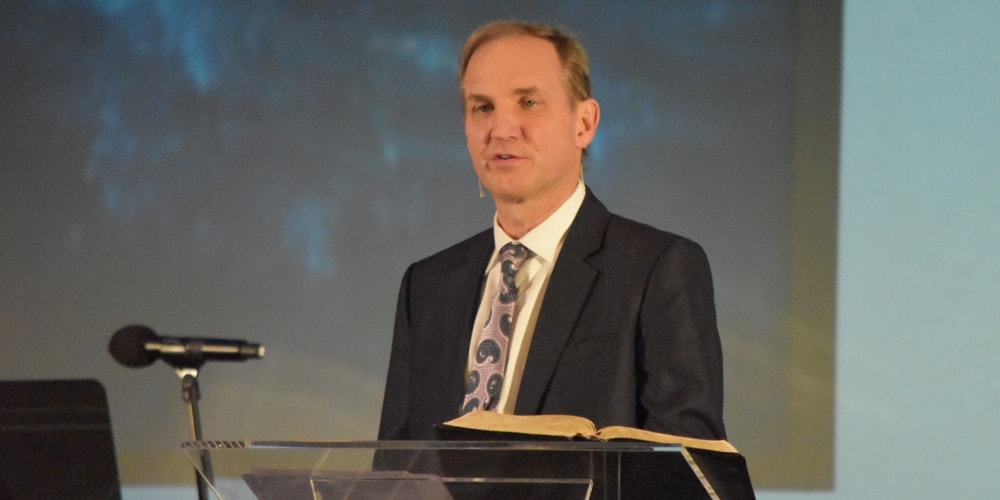
Hundreds of Seventh-day Adventist physicians, dentists, and ophthalmologists received an invitation to embrace the mission of sharing God’s message in their practice. The unambiguous call to get involved in God’s mission was the highlight of the opening night of the 17th Adventist Medical Evangelism Network (AMEN) Annual Conference in Indian Wells, California, United States, October 28-31, 2021.
“Our prayer is that at this conference, you will discover new, practical ways to become more intentional about sharing Christ,” event organizers wrote in a welcoming message to participants. “The urgency of the times demands something more of each one of us. We are under a divine obligation with a divine mandate, to accomplish a divine objective with divine opportunities before us,” they wrote.
A Different Kind of Event
After a two-year hiatus because of pandemic-related restrictions, more than 450 health-care practitioners who registered said they were happy to gather in person. Many of them, whose life and practice were upended since the beginning of the pandemic, said they valued gathering to reflect, share experiences, network, and worship together.
Organizers encouraged attendees to follow current health department guidelines and laid out some preventive measures, including wearing masks indoors. Group meals were outdoors, and staff and volunteers tested negative for COVID-19 within 72-hours of the conference commencement.
“We are still in the midst of a pandemic,” Carlos Moretta, organizing board chair, acknowledged in his welcoming greeting as he called everyone to act responsibly. “We are scientists; we know microbiology. So let’s be kind; let’s take care of each other,” he said. “Let us make this a super-spreader event of encouragement and inspiration.”
For the first time, meetings and sessions were livestreamed, and their audio recordings are also available at audioverse.org, organizers said.
A Strong Sense of Urgency
The theme of the 2021 AMEN conference was “While It Is Day,” a phrase taken from the words of Jesus in John 9:4. Jesus said, “I must work the works of Him who sent Me while it is day; the night is coming when no one can work.” Adventist health practitioners said they gathered following that sense of the importance of the message and urgency of the times.
“Our world has experienced a crisis of pandemic proportions,” organizers shared in their welcoming message. “A fast-moving virus has ravaged country after country at lightning speed and has changed life the way we know it. Many of our patients are perplexed, wondering where is this world headed? Why is there so much sickness, suffering, and death? What is the meaning of life?”
Health-care practitioners emphasized that there are answers and that they, as Adventist professionals, have the unique opportunity to share a message of hope and healing with a hurting world. But it’s a job, they said, that carries a sense of urgency.
“Jesus tells us that there is a window of opportunity during which we must work to advance His kingdom,” they wrote. “Recent events have shown us that this window is quickly closing. Just as Jesus was sent by God to a hurting, sin-sick planet, we are sent on a divine mission into our communities. As health-care professionals, God gives us opportunities every day to minister to people’s physical, mental, and spiritual needs,” they emphasized.
Against this new reality, event leaders called every Adventist health-care professional to make patient encounters “more purposeful, more intentional,” adding, “Our rapport with patients must lead us to a place where connections are made and defensive walls drop.”
Building a Wall of Protection
In his October 28 keynote address, AMEN president Brian Schwartz called attendees to “build a wall of protection while it is still day.” Reflecting on the biblical story of Nehemiah when he led the rebuilding of Jerusalem’s walls, Schwartz called Adventist health-care practitioners to consider the parallels with the times we must live in. Nehemiah’s work of restoration, Schwartz said, demanded revival, repentance, and reformation. Likewise, those are characteristics “never more needed than [they] are now.”
Against that background, Schwartz called Adventist practitioners to use their practice to “build a wall of protection” around God’s message for this time. That wall, he said, is the medical missionary work, which Adventist Church cofounder Ellen G. White called “the entering wedge” and “the right arm of the gospel.”
Beyond Health Care
Schwartz acknowledged that as Adventist health-care professionals, they have sometimes been guilty of entering into only the health work. But the health work without the gospel lacks purpose, he emphasized. “What if I give my patients an extra five, seven, or ten years of life [but] I haven’t connected them to Jesus, who wants to give eternal life? It’s useless!” he said.
Based on his experience as an intervention cardiologist, Schwartz shared how in the past he used to give his sick patients advice such as, “You should stop smoking.” It is something that, he shared, patients already know. They just don’t have the power to stop.
“If I tell my patient to muster more willpower, I am calling him to be a legalist, to rely on his own strength, in his own power, which is absolutely useless,” Schwartz said. “I can connect my patients, telling them, ‘Jesus wants to save you from smoking; Jesus has already given you the victory; He will give you the strength to overcome. Now, would it be OK if I prayed with you?’”
Results have been impressive, Schwartz said. “Since I adopted this approach, patients who have overcome smoking have gone from about 10 percent to more than 70 percent,” he shared. “I believe we need to incorporate this into every aspect of what we do as physicians . . . to tap patients into that source of power so they can make changes in their lives.” And he added, “This is what Jesus called for—to heal body, mind, and spirit. This is what medical ministry is all about.”